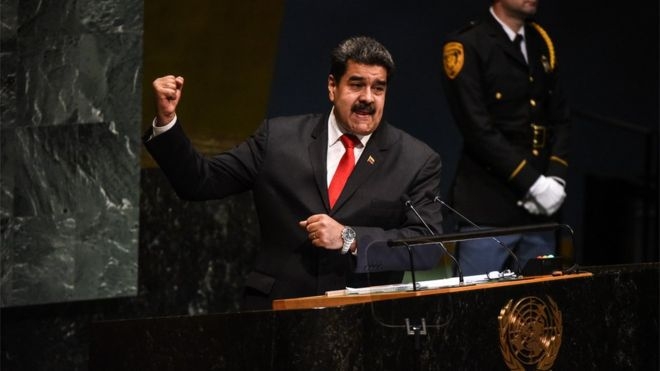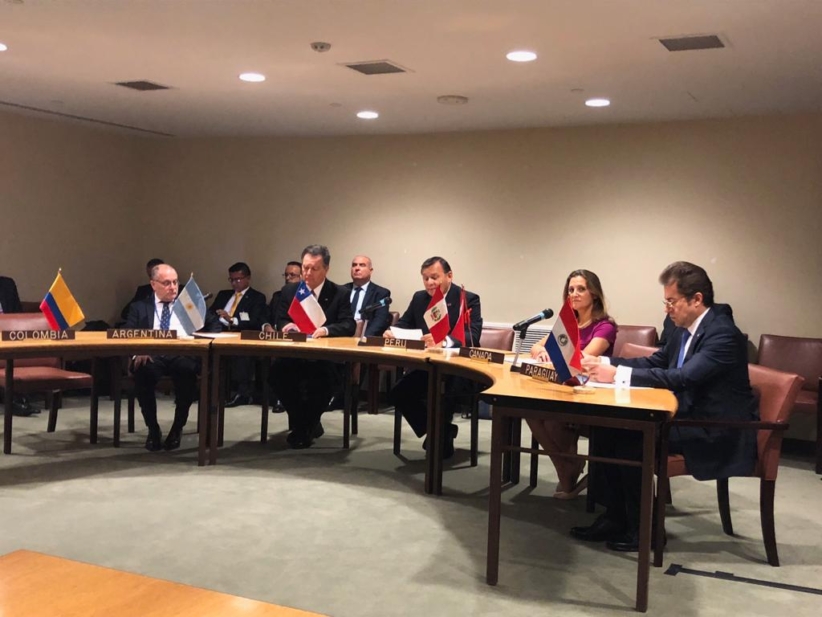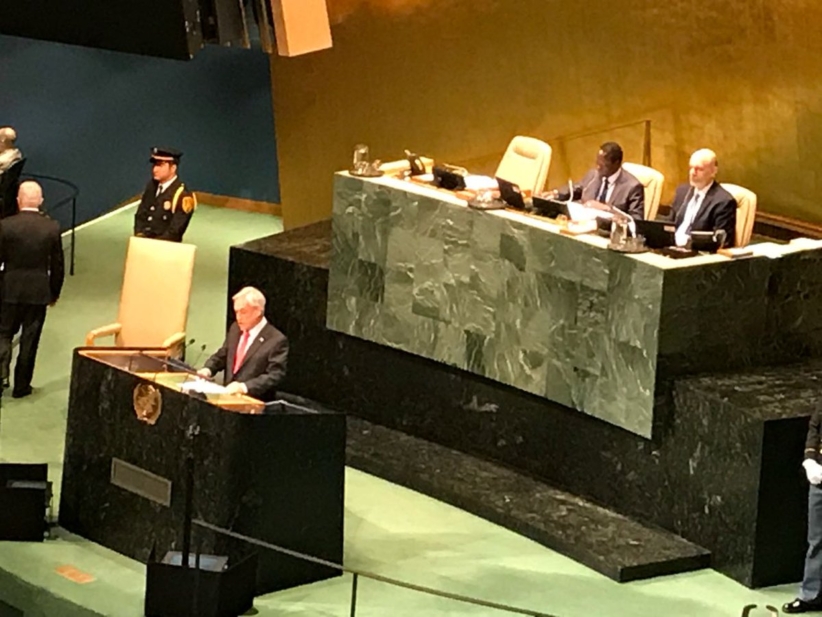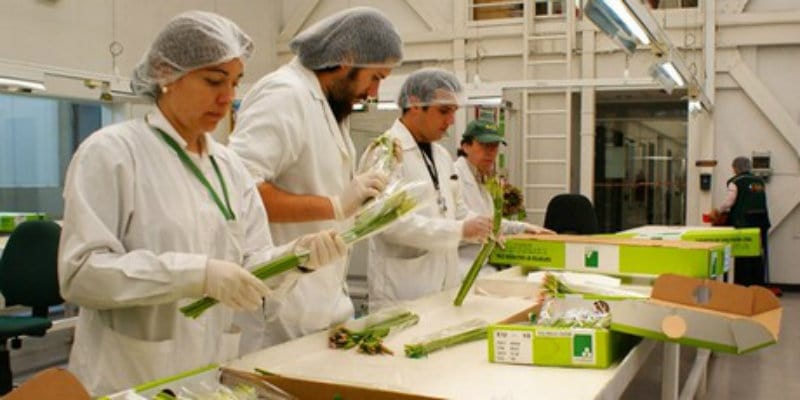
NEW YORK – Six governments have taken an unprecedented step by requesting the International Criminal Court (ICC) to open an investigation in Venezuela.
The governments of five South American nations – Chile, Peru, Paraguay, Argentina, Colombia – and Canada referred the situation in Venezuela to the ICC prosecutor, Fatou Bensouda, for investigation. This is the first time that ICC member governments have sought an investigation of potential crimes that took place entirely on the territory of another country.
They presented their request at the UN General Assembly in New York as Nicolas Maduro was on his way to the gathering, where concern has been voiced over his repressive leadership and the related economic and humanitarian crisis, including the outpouring of Venezuelan refugees into neighboring countries.

The filing nations called upon the ICC to investigate alleged torture, rape, murder, violations of due process and crimes against humanity perpetrated by Maduro’s government since February 2014.
In their seven-page letter, the nations referred to reports by the UN High Commissioner for Human Rights, the Inter-American Commission on Human Rights and international lawyers documenting the suspected crimes.
“To remain indifferent or speculative in front of this reality could be perceived as being complicit with the regime. We are not going to be complicit,” Paraguayan Foreign Minister Andres Rodriguez Pedotti said.
President Sebastian Piñera used the UNGA stage to assure that Chile will continue to help the country through whatever is within its reach and by following international law to help the Venezuelan nation recover its freedom and democracy and to get out of the current situation in the country.

“Venezuela is governed by a regime that does not respect any of its principles or freedom, nor democracy nor human rights and is a society ravaged by a moral, political, economic, social and humanitarian crisis,” he said in his speech in New York.
Colombian President Ivan Duque called for the creation of a multilateral fund to help Venezuela’s neighbors deal with the influx of refugees.
While the request for a probe does not guarantee its taking place, it could speed up and broaden the scope of an ongoing preliminary probe in the ICC.
The secretary general of the Organization of American States (OAS), Luis Almagro, applauded the six countries’ action in “creating a crucial milestone in the interests of justice, accountability, non-repetition and reparation to the victims of the Venezuelan dictatorship.”
Total respaldo a Argentina, Chile, Colombia, Paraguay, Perú y Canadá x paso histórico dado. Es un hito fundamental xa la justicia, rendición de cuentas, no repetición y reparación de víctimas de la dictadura de #Venezuela #OEAconVzlahttps://t.co/F3ZU680OoP pic.twitter.com/4CBVy4xb4u
— Luis Almagro (@Almagro_OEA2015) September 26, 2018
“This unprecedented step reflects the growing alarm among other countries about the human rights catastrophe that has overtaken Venezuela,” said José Miguel Vivanco, Americas director at Human Rights Watch. “With the request to the ICC prosecutor, these governments are making clear that the total lack of justice for Venezuela’s ongoing abuses is unacceptable.”
The political crisis in Venezuela has exacerbated an already feeble economy and sent more than 2 million of Venezuelans fleeing into neighboring countries, with 1 million landing in Colombia alone.
New US sanctions target Maduro’s wife, key Venezuelan officials
Human rights situation in Venezuela
In two crackdowns, in 2014 and 2017, Venezuelan security forces committed systematic abuses against critics, including torture, Human Rights Watch research shows. They detained more than 5,400 people between April and July 2017. Members of the security forces have beaten detainees severely and tortured them with electric shocks, asphyxiation, sexual assault, and other brutal techniques.
A Human Rights Watch research also shows that the abuses were not isolated cases or the result of excesses by rogue security force members. Instead, various security forces committed widespread abuses repeatedly over a period of several months in multiple locations across the country, including in controlled environments such as military installations, both in 2014 and in 2017.
In November 2017, Human Rights Watch shared with the Office of the Prosecutor at the ICC the organization’s findings about systematic abuses by Venezuelan security forces.
A recent report by the Office of the High Commissioner for Human Rights (OHCHR) found that between July 2015 and March 2017, Venezuelan security forces killed 505 people, including 24 children. Some of the killings were extrajudicial executions.
In May 2018, an expert panel appointed by the Organization of American States compiled a damning assessment of the Venezuelan government’s human rights record. The ICC Office of the Prosecutor should thoroughly evaluate the report, which concluded that crimes against humanity may have been committed.
In February, the ICC prosecutor announced the opening of a preliminary examination of the situation in Venezuela. The aim of a preliminary examination is to determine whether the ICC should proceed with a full investigation. An ICC states party’s referral of a situation, under article 14 of the Rome Statute, the ICC treaty, may also trigger a preliminary examination.
The referral comes against the backdrop of a September announcement by the United States administration that it will cease cooperation with the ICC and take retaliatory measures in the event ICC investigations reach US citizens or the citizens of ally countries. While the US is not an ICC member country, a campaign under the George W. Bush administration to undermine the ICC gradually gave way to a more supportive US posture, beginning in 2005. The ICC will often face politicized opposition, given its mandate to hold those responsible for the world’s worst crimes to account. In the face of the US threats, ICC member countries should ensure the court has the backing it needs to carry out its work independently.
Based on past practice, the referral by the other countries is not expected to lead to the opening of a separate preliminary examination, but rather will provide an additional basis for the prosecutor’s ongoing review and independent assessment.
One important impact of the referral by member countries is that should the ICC prosecutor conclude that an investigation is warranted, her office can open one without first seeking approval by a panel of ICC judges. This judicial approval would have been required without a referral by other member countries.
Because the ICC is a court of last resort, the prosecutor faces a high threshold. Her current preliminary inquiry will analyze whether crimes specified in the ICC treaty have been committed; whether those crimes are sufficiently grave to merit the court’s attention; and whether national authorities are genuinely carrying out credible investigations and, if appropriate, prosecutions of the cases under ICC consideration.
Venezuelan officials do not appear to have taken any steps to prevent abuses and have done nothing to hold those responsible for serious violations to account. Instead, they have often downplayed the abuses or issued implausible blanket denials.
ICC states parties have referred a number of situations to the court prosecutor for investigation, but with one exception, these have been self-referrals – that is referrals by the government of the country where crimes are alleged to have been committed. In the only previous exception, the government of Comoros referred a situation for investigation encompassing a vessel registered to it, as well as vessels registered to two other states parties, Cambodia and Greece. The ICC prosecutor declined to open an investigation into the situation.
The ICC was created with the support of the UN in 2002 to prosecute war crimes, genocide and other crimes against humanity that otherwise might not be brought to justice.



